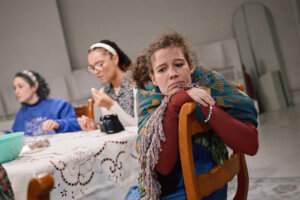A new play asks: What if the biblical matriarchs lived today?
‘The Matriarchs’ challenges audiences to accept life’s uncertainties — and imagines what Leah and Rebecca would’ve studied in college.

Helen Cespedes plays Miriam in the new off-Broadway play ‘The Matriarchs.’ Photo by Valeria Terranova/art by Liana Finck
This piece contains spoilers for the play The Matriarchs.
In less than 20 minutes, The Matriarchs asks an inflammatory question: Can you compare King David to Hitler? The question is almost heretical — but that’s what makes it so Jewish. For six 13-year old girls in Teaneck, New Jersey, this single question opens up a debate about purpose and sacrifice that will be a theme throughout their entire lives — but they don’t know it yet.
The Matriarchs, the latest play from writer and actress Liba Vaynberg (The Gett, Round Table), follows the lives of Miriam, Sara, Rebecca, Rachel, Leah and Tziporrah, each one representing their Biblical matriarch namesake in their personalities and life course. Set over the course of decades, with humor and an impressive amount of Jewish references that only those steeped in biblical expertise might catch, the play asks: Why is life full of sacrifices, especially ones that seem unjustified?
Matriarchs opens with the girls studying Nezikin, a tractate of the Talmud about damages, under the care of Mrs. H, Miriam’s omniscient and foreboding mother, represented only by a booming, disembodied voice. Miriam always turns to her for support when things with her friends get complicated, although Mrs. H — like the divine being she represents — rarely offers a straightforward or easy solution.
During their Talmudic discussion, Miriam introduces the King David-Hitler comparison, which she heard from her classmate. He argued that King David and Hitler shared a belief in sacrificing lives for the continued “peace and prosperity” of a nation. Both, he claimed, saw their victims as animals being laid on an altar to a higher purpose.
The girls begin to debate the comparison, but almost immediately, the discussion turns to their own hopes in life. The scene is played skillfully by the actresses with the appropriate intensity, and enough childlike levity to remind you that these are still kids whose biggest concerns are still acne and teen crushes — or ancient ones, in the case of Sara, who wishes she could’ve married Rashi.

When Sara argues that sometimes women must give up their needs for the sake of their husbands — as Sara fantasizes about doing — Rivkah compares marriage to the slaughter of a woman’s livelihood, and wives to the sacrifices of King David.
This hypothesis is put to the test after as the show jumps forward in time, to the day of Tzipporah’s wedding. As the other women help her get ready, they discuss what they have lost in their own lives, whether because of their sacrifices for their marriages, their children or their religion. A second time jump shows the results of their choices, not all of which seem to have been worth it.
After the first time jump, we learn Rivkah has completely abandoned her religious upbringing. But after the second leap forward, she’s found herself, encouraged by her wife and twin sons, reconnecting with Judaism. Rachel’s career doesn’t pan out the way she anticipates — and an unexpected pregnancy causes further complications. Sara, who saw being able to bear children as the reason she was made a woman, struggles with infertility and a husband who won’t stop trying to conceive, forcing her through multiple miscarriages. Miriam, meanwhile, becomes a rabbi, believing that studying Torah would help her lead a good life and avoid misfortune. Each girl’s path is a smart imitation of their matriarch’s actual story, transposed into the modern day — my personal favorite substitution is weed edibles instead of Leah’s mandrake root.
Despite starting with strong convictions and senses of purpose, the girls learn that what happens in their lives is mostly out of their control. Rivkah can’t run from her upbringing, Tzipporah can’t force a happy marriage, and Miriam can’t hack life’s secrets by studying Torah. After an unexpected loss, Miriam’s entire belief system is uprooted and she is left with one question: “Why?”
It’s a question human beings have been grappling with since the beginning of our existence. Why do bad things happen to good people? Why are the best laid plans always upset? Why does any of it even matter? From the time of the Biblical matriarchs to today, we still haven’t figured it out.
Vaynberg is not interested in providing a solid answer, and the play thrives in some of its most hopeless moments. It is when the characters are at their most vulnerable that one can really relate to them and see the eternal lessons that can be garnered from the stories of women in the Bible. Vaynberg avoids a too-neat ending, but one that is still satisfying, an assurance that life, no matter what it brings, is meant to be lived in full. It’s not worth it to spend all your energy only worrying about the rare, major moments of upheaval.
As frightening as it is to not know what the future holds, it’s just something we have to accept. And the sooner we do, the sooner we’ll be able to enjoy every moment.
The Matriarchs is showing at the Theaterlab in New York through September 28.

















